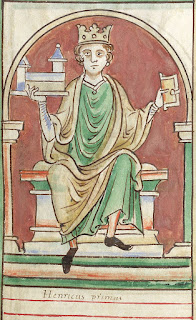Motiones: Beyond the Definition
 |
| Henry I photo credit: By This file has been provided by the British Library from its digital collections.Catalogue entry: Cotton MS Claudius D viT |
In Latin today, I ran across the word motiones. I'm reading Book X of Orderic Vitalis and *spoiler alert* William II has just been killed in the New Forest by an arrow from one of his companions. Accident, purposeful hit hired by brother Henry? The ages still debate although it leans towards a simple hunting accident. Anyway, one of the words I translated for this week was motiones, which I translated as movements. Yet, if you move beyond the classical definition of Cassell's and into the medieval definition of Niermeyer, the power of the word increases. Motiones is not just movements, its further defined as insurrection or revolts. There is an entire visual that goes with that one word, one that is lost without proper context.
For instance, I've been watching season 4 of Turn: Washington's Spies. I highly recommend it, even though it's one of those shows that mixes fiction with real history. Benedict Arnold is a character. If you grew up and studied the American Revolution, you know who Benedict Arnold is and what he represents to Americans. To be a Benedict Arnold is one who sells out his country, a traitor. It takes a certain detachment to divorce your knowledge of Arnold from the man who plays him before his legacy was set. His name, two words, creates a visual that is hard to explain to someone its power to someone who has not studied our nation's history.
Motiones is similar in that it evokes that sense of chaos and urgency created when a monarch has died. It creates that visual that goes beyond the literal translation of one word. It was pointed out to me that is reason enough to ensure we are reading primary sources for history, even moreso that we can read them in the original language and have a contextual understanding for that language.
That is what I love about learning to be a historian - a medievalist, the depth of discovery when you peer beyond the surface. Today's lesson is but one example, this one in the language. Probably most of us have joked about something in life with the phrase "but what does it all mean?"
Orderic chooses certain words for what they mean, what they meant to the people around him. Even the little bit I've read so far has generated interesting discussions about his own bias and training. The study of medieval history goes deeper than I could have imagined four years ago when I started college. There is a complexity to their society that I could (and hope) to spend the rest of my life exploring, hopefully without real life motiones.


Comments
Post a Comment